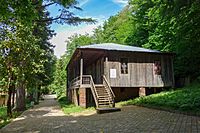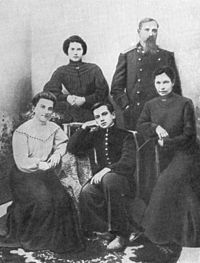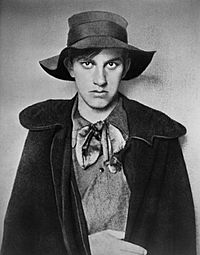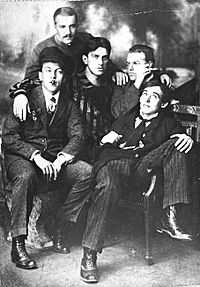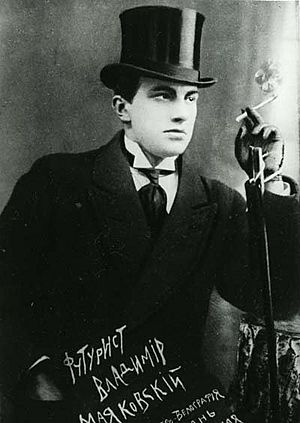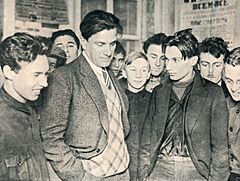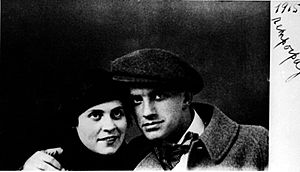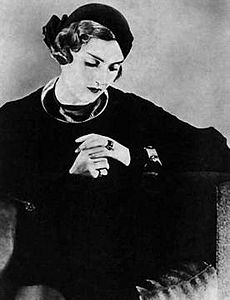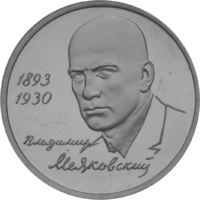Vladimir Mayakovsky facts for kids
Quick facts for kids
Vladimir Mayakovsky
|
|
|---|---|
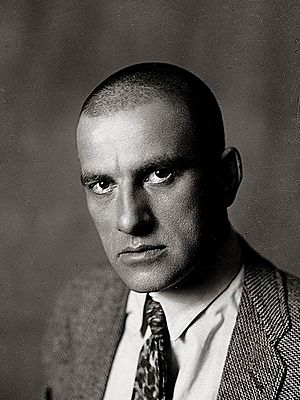
Mayakovsky in 1920
|
|
| Born | Vladimir Vladimirovich Mayakovsky 19 July [O.S. 7 July] 1893 Baghdati, Kutais Governorate, Russian Empire |
| Died | 14 April 1930 (aged 36) Moscow, Russian SFSR, Soviet Union |
| Citizenship | Russian Empire, Soviet Union |
| Alma mater | Stroganov Moscow State University of Arts and Industry, Moscow School of Painting, Sculpture and Architecture |
| Period | 1912–1930 |
| Literary movement | Russian Futurism |
| Signature | |
 |
|
Vladimir Vladimirovich Mayakovsky (UK: /ˌmaɪəˈkɒfski/, US: /ˌmɑːjəˈkɔːfski/; Russian: Влади́мир Влади́мирович Маяко́вский, IPA: [vlɐˈdʲimʲɪr vlɐˈdʲimʲɪrəvʲɪtɕ məjɪˈkofskʲɪj]; 19 July [O.S. 7 July] 1893 – 14 April 1930) was a Russian and Soviet poet, playwright, artist, and actor.
During his early, pre-Revolution period leading into 1917, Mayakovsky became renowned as a prominent figure of the Russian Futurist movement. He co-signed the Futurist manifesto, A Slap in the Face of Public Taste (1913), and wrote such poems as "A Cloud in Trousers" (1915) and "Backbone Flute" (1916). Mayakovsky produced a large and diverse body of work during the course of his career: he wrote poems, wrote and directed plays, appeared in films, edited the art journal LEF, and produced agitprop posters in support of the Communist Party during the Russian Civil War of 1917–1922. Though Mayakovsky's work regularly demonstrated ideological and patriotic support for the ideology of the Bolsheviks and a strong admiration of Vladimir Lenin, his relationship with the Soviet state was always complex and often tumultuous. Mayakovsky often found himself engaged in confrontation with the increasing involvement of the Soviet state in cultural censorship and the development of the State doctrine of Socialist realism. Works that criticized or satirized aspects of the Soviet system, such as the poem "Talking With the Taxman About Poetry" (1926), and the plays The Bedbug (1929) and The Bathhouse (1929), met with scorn from the Soviet state and literary establishment.
In 1930, Mayakovsky died. Even after death, his relationship with the Soviet state remained unsteady. Though Mayakovsky had previously been harshly criticized by Soviet governmental bodies such as the Russian Association of Proletarian Writers (RAPP), Premier Joseph Stalin described Mayakovsky after his death as "the best and the most talented poet of our Soviet epoch".
Contents
Life and career
Vladimir Vladimirovich Mayakovsky was born in 1893 in Baghdati, Kutais Governorate, Georgia, then part of the Russian Empire, to Alexandra Alexeyevna (née Pavlenko), a housewife, and Vladimir Mayakovsky, a local forester. His father belonged to a noble family and was a distant relative of the writer Grigory Danilevsky. Vladimir Vladimirovich had two sisters, Olga and Lyudmila, and a brother Konstantin, who died at the age of three. The family was of Russian and Zaporozhian Cossack descent on their father's side and Ukrainian on their mother's.
At home the family spoke Russian. With his friends and at school, Mayakovsky spoke Georgian. "I was born in the Caucasus, my father is a Cossack, my mother is Ukrainian. My mother tongue is Georgian. Thus three cultures are united in me," he told the Prague newspaper Prager Presse in a 1927 interview. For Mayakovsky, Georgia was his eternal symbol of beauty. "I know, it's nonsense, Eden and Paradise, but since people sang about them // It must have been Georgia, the joyful land, that those poets were having in mind", he wrote later.
In 1902 Mayakovsky joined the Kutais gymnasium. Later as a 14-year-old, he took part in socialist demonstrations in the town of Kutaisi. His mother, aware of his activities, apparently did not mind. "People around warned us we were giving a young boy too much freedom. But I saw him developing according to the new trends, sympathized with him and pandered to his aspirations," she later remembered. His father died suddenly in 1906, when Mayakovsky was thirteen. (The father pricked his finger on a rusty pin while filing papers and died of blood poisoning.) His widowed mother moved the family to Moscow after selling all their movable property.
In July 1906 Mayakovsky joined the 4th form of Moscow's 5th Classic gymnasium and soon developed a passion for Marxist literature. "Never cared for fiction. For me it was philosophy, Hegel, natural sciences, but first and foremost, Marxism. There'd be no higher art for me than "The Foreword" by Marx," he recalled in the 1920s in his autobiography I, Myself. In 1907 Mayakovsky became a member of his gymnasium's underground Social Democrats' circle, taking part in numerous activities of the Russian Social Democratic Labour Party which he, given the nickname "Comrade Konstantin", joined the same year. In 1908, the boy was dismissed from the gymnasium because his mother was no longer able to afford the tuition fees. For two years he studied at the Stroganov School of Industrial Arts, where his sister Lyudmila had started her studies a few years earlier.
As a young Bolshevik activist, Mayakovsky distributed propaganda leaflets, possessed a pistol without a license, and in 1909 got involved in smuggling female political activists out of prison. This resulted in a series of arrests and finally an 11-month imprisonment. It was in solitary confinement in the Moscow Butyrka prison that Mayakovsky started writing verses for the first time. "Revolution and poetry got entangled in my head and became one," he wrote in I, Myself. As a minor, Mayakovsky was spared a serious prison sentence (with associated deportation) and in January 1910 was released. A warden confiscated the young man's notebook. Years later Mayakovsky conceded that was all for the better, yet he always cited 1909 as the year his literary career started.
Upon his release from prison, Mayakovsky remained an ardent Socialist, but realized his own inadequacy as a serious revolutionary. Having left the Party (never to re-join it), he concentrated on education. "I stopped my Party activities. Sat down and started to learn… Now my intention was to make the Socialist art," he later remembered.
In 1911 Mayakovsky enrolled in the Moscow Art School. In September 1911 a brief encounter with fellow student David Burlyuk (which nearly ended with a fight) led to a lasting friendship and had historic consequences for the nascent Russian Futurist movement. Mayakovsky became an active member (and soon a spokesman) for the group Hylaea (Гилея), which sought to free the arts from academic traditions: its members would read poetry on street corners, throw tea at their audiences, and make their public appearances an annoyance for the art establishment.
Burlyuk, on having heard Mayakovsky's verses, declared him "a genius poet". Later Soviet researchers tried to downplay the significance of the fact, but even after their friendship ended and their ways parted, Mayakovsky continued to give credit to his mentor, referring to him as "my wonderful friend". "It was Burlyuk who turned me into a poet. He read the French and the Germans to me. He pressed books on me. He would come and talk endlessly. He didn't let me get away. He would subsidize me with 50 kopeks each day so that I'd write and not be hungry," Mayakovsky wrote in "I, Myself".
Literary career
On 17 November 1912, Mayakovsky made his first public performance at Stray Dog, the artistic basement in Saint Petersburg. In December of that year his first published poems, "Night" (Ночь) and "Morning" (Утро) appeared in the Futurists' Manifesto A Slap in the Face of Public Taste, signed by Mayakovsky, as well as Velemir Khlebnikov, David Burlyuk and Alexey Kruchenykh, calling among other things for... "throwing Pushkin, Dostoyevsky, Tolstoy, etc, etc, off the steamboat of the modernity."
In October 1913 Mayakovsky gave the performance at the Pink Lantern café, reciting his new poem "Take That!" (Нате!) for the first time. The concert at the Petersburg's Luna-Park saw the premiere of the poetic monodrama Vladimir Mayakovsky, with the author in a leading role, stage decorations designed by Pavel Filonov and Iosif Shkolnik. In 1913 Mayakovsky's first poetry collection called I (Я) came out, its original limited edition 300 copies lithographically printed. This four-poem cycle, handwritten and illustrated by Vasily Tchekrygin and Leo Shektel, later formed Part One of the 1916 compilation Simple as Mooing.
In December 1913 year Mayakovsky along with his fellow Futurist group members embarked on the Russian tour, which took them to 17 cities, including Simferopol, Sevastopol, Kerch, Odessa and Kishinev. It was a riotous affair. The audiences would go wild and often the police stopped the readings. The poets dressed outlandishly, and Mayakovsky, "a regular scandal-maker" in his own words, used to appear on stage in a self-made yellow shirt which became the token of his early stage persona. The tour ended on 13 April 1914 in Kaluga and cost Mayakovsky and Burlyuk their education: both were expelled from the Art school, their public appearances deemed incompatible with the school's academic principles. They learned of it while in Poltava from the local police chief, who chose the occasion as a pretext to ban the Futurists from performing on stage.
Having won 65 rubles in a lottery, in May 1914 Mayakovsky went to Kuokkala, near Petrograd. Here he put the finishing touches to A Cloud in Trousers, frequented Korney Chukovsky's dacha, sat for Ilya Repin's painting sessions and met Maxim Gorky for the first time. As World War I began, Mayakovsky volunteered but was rejected as 'politically unreliable'. He worked for the Lubok Today company which produced patriotic lubok pictures, and in the Nov (Virgin Land) newspaper, which published several of his anti-war poems ("Mother and an Evening Killed by the Germans", "The War is Declared", "Me and Napoleon" among others). In summer 1915 Mayakovsky moved to Petrograd where he started contributing to the New Satyrikon magazine, writing mostly humorous verse in the vein of Sasha Tchorny, one of the journal's former stalwarts. Then Maxim Gorky invited the poet to work for his journal, Letopis.
In June of that year Mayakovsky fell in love with a married woman, Lilya Brik, who eagerly took upon herself the role of a 'muse'. Her husband Osip Brik seemed not to mind and became the poet's close friend; later he published several books by Mayakovsky and used his entrepreneurial talents to support the Futurist movement. This love affair, as well as his ideas on World War I and Socialism, strongly influenced Mayakovsky's best known works: A Cloud in Trousers (1915), his first major poem of appreciable length, followed by Backbone Flute (1915), The War and the World (1916) and The Man (1918).
When his mobilization form finally arrived in the autumn of 1915, Mayakovsky found himself unwilling to go to the frontlines. Assisted by Gorky, he joined the Petrograd Military Driving school as a draftsman and was studying there until early 1917. In 1916 Parus (The Sail) Publishers (again led by Gorky), published Mayakovsky's poetry compilation called Simple As Mooing.
1917–1927
Mayakovsky embraced the Bolshevik Russian Revolution wholeheartedly and for a while even worked in Smolny, Petrograd, where he saw Vladimir Lenin. "To accept or not to accept, there was no such question… [That was] my Revolution," he wrote in I, Myself autobiography. In November 1917 he took part in the Communist Party's Central committee-sanctioned assembly of writers, painters and theatre directors who expressed their allegiance to the new political regime. In December that year "The Left March" (Левый марш, 1918) premiered at the Navy Theater, with sailors as an audience.
In 1918 Mayakovsky started the short-lived Futurist Paper. He also starred in three silent films made at the Neptun Studios in Petrograd he had written scripts for. The only surviving one, The Lady and the Hooligan, was based on the La maestrina degli operai (The Workers' Young Schoolmistress) published in 1895 by Edmondo De Amicis, and directed by Evgeny Slavinsky. The other two, Born Not for the Money and Shackled by Film were directed by Nikandr Turkin and are presumed lost.
On 7 November 1918 Mayakovsky's play Mystery-Bouffe premiered at the Petrograd Musical Drama Theatre. Representing a universal flood and the subsequent joyful triumph of the "Unclean" (the proletariat) over the "Clean" (the bourgeoisie), this satirical drama's re-worked, 1921 version enjoyed even greater popular acclaim. However, the author's attempt to make a film of the play failed, its language deemed "incomprehensible for the masses."
In December 1918 Mayakovsky was involved with Osip Brik in discussions with the Viborg district party school of the Russian Communist Party (bolsheviks) (RKP(b)) to set up a Futurist organisation affiliated to the party. Named Komfut the organisation was formally founded in January 1919, but was swiftly dissolved following the intervention of Anatoly Lunacharsky.
In March 1919 Mayakovsky moved back to Moscow where Vladimir Mayakovsky's Collected Works 1909–1919 was released. The same month he started working for the Russian State Telegraph Agency (ROSTA) creating—both graphic and text—satirical Agitprop posters, aimed mostly at informing the country's largely illiterate population of the current events. In the cultural climate of the early Soviet Union, his popularity grew rapidly, even if among the members of the first Bolshevik government, only Anatoly Lunacharsky supported him; others treated the Futurist art more skeptically. Mayakovsky's 1921 poem, 150 000 000 failed to impress Lenin, who apparently saw in it little more than a formal futuristic experiment. More favourably received by the Soviet leader was his next one, "Re Conferences" which came out in April.
A vigorous spokesman for the Communist Party, Mayakovsky expressed himself in many ways. Contributing simultaneously to numerous Soviet newspapers, he poured out topical propagandistic verses and wrote didactic booklets for children while lecturing and reciting all over Russia.
In May 1922, after a performance at the House of Publishing at the charity auction collecting money for the victims of Povolzhye famine, he went abroad for the first time, visiting Riga, Berlin and Paris, where he was invited to the studios of Fernand Léger and Picasso. Several books, including The West and Paris cycles (1922–1925) came out as a result.
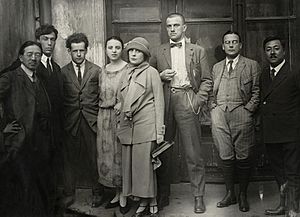
From 1922 to 1928, Mayakovsky was a prominent member of the Left Art Front (LEF) he helped to found (and coin its "literature of fact, not fiction" credo) and for a while defined his work as Communist Futurism (комфут). He edited, along with Sergei Tretyakov and Osip Brik, the journal LEF, its stated objective being "re-examining the ideology and practices of the so-called leftist art, rejecting individualism and increasing Art's value for the developing Communism." The journal's first, March 1923, issue featured Mayakovsky's poem About That (Про это). Regarded as a LEF manifesto, it soon came out as a book illustrated by Alexander Rodchenko who also used some photographs made by Mayakovsky and Lilya Brik.
In May 1923 Mayakovsky spoke at a massive protest rally in Moscow, in the wake of Vatslav Vorovsky's assassination. In October 1924 he gave numerous public readings of the 3,000-line epic Vladimir Ilyich Lenin written on the death of the Soviet Communist leader. Next February it came out as a book, published by Gosizdat. Five years later Mayakovsky's rendition of the third part of the poem, at the Lenin Memorial evening in the Bolshoi Theatre ended with 20-minutes ovation. In May 1925 Mayakovsky's second trip took him to several European cities, then to the United States, Mexico and Cuba. The book of essays My Discovery of America came out later that year.
In January 1927 the first issue of the New LEF magazine came out, again under Mayakovsky's supervision, now focusing on the documentary art. In all, 24 issues of it came out. In October 1927 Mayakovsky recited his new poem All Right! (Хорошо!) for the audience of the Moscow Party conference activists in the Moscow's Red Hall. In November 1927 a play called The 25th (and based upon the All Right! poem) premiered at the Leningrad Maly Opera Theatre. In summer 1928, disillusioned with LEF, he left both the organization and its magazine.
1929–1930
In 1929 the publishing house Goslitizdat released The Works by V.V. Mayakovsky in 4 volumes. In September 1929 the first assembly of the newly formed REF group gathered with Mayakovsky in the chair. But behind this façade the poet's relationship with the Soviet literary establishment was quickly deteriorating. Both the REF-organized exhibition of Mayakovsky's work, celebrating the 20th anniversary of his literary career and the parallel event in the Writers' Club, "20 Years of Work" in February 1930, were ignored by the RAPP members and, more importantly, the Party leadership, particularly Stalin whose attendance he was greatly anticipating. It was becoming evident that the experimental art was no longer welcomed by the regime, and the country's most famous poet irritated a lot of people.
Two of Mayakovsky's satirical plays, written specifically for Meyerkhold Theatre, The Bedbug (1929) and (in particular) The Bathhouse (1930) evoked stormy criticism from the Russian Association of Proletarian Writers. In February 1930 Mayakovsky joined RAPP, but in Pravda on 9 March, a leading member of RAPP, Vladimir Yermilov, writing "with all the authority of a 23 year old who had not seen the play but had read part of the script" categorised Mayakovsky as one of the 'petit bourgeois revolutionary intelligentsia', adding that "we hear a false 'leftist' note in Mayakovsky, a note which we know not only from literature....". This was a potentially deadly political accusation, in that it implied an intellectual link between Mayakovsky and the Left Opposition, led by Leon Trotsky, whose supporters were in exile or prison. (Trotsky was known to admire Mayakovsky's poetry). Mayakovsky retaliated by creating a huge poster mocking Yermilov, but was ordered by RAPP to take it down.
The smear campaign continued in the Soviet press, sporting slogans like "Down with Mayakovshchina!" On 9 April 1930 Mayakovsky, reading his new poem "At the Top of My Voice", was shouted down by the student audience, for being 'too obscure'.
Death
On 12 April 1930, Mayakovsky was seen in public for the last time: he took part in a discussion at the Sovnarkom meeting concerning the proposed copyright law. On 14 April 1930, his current partner, actress Veronika Polonskaya, found the poet dead in his flat. Mayakovsky's funeral on 17 April 1930, was attended by around 150,000, the third largest event of public mourning in Soviet history, surpassed only by those of Vladimir Lenin and Joseph Stalin. He was interred at the Moscow Novodevichy Cemetery.
Private life
Mayakovsky met husband and wife Osip and Lilya Brik in July 1915 at their dacha in Malakhovka nearby Moscow. Soon after that Lilya's sister, Elsa Triolet invited him to the Briks' Petrograd flat. The couple at the time showed no interest in literature and were successful corals traders. That evening Mayakovsky recited the yet unpublished poem A Cloud in Trousers and announced it as dedicated to the hostess ("For you, Lilya").
Soon after Osip Brik published A Cloud in Trousers in September 1915, Mayakovsky settled in the Palace Royal hotel at the Pushkinskaya Street, Petrograd, not far from where they lived. He introduced the couple to his Futurist friends and the Briks' flat quickly evolved into a modern literary salon. From then on Mayakovsky was dedicating every one of his large poems (with the obvious exception of Vladimir Ilyich Lenin) to Lilya; such dedications later started to appear even in the texts he'd written before they met, much to her displeasure. In summer 1918, soon after Lilya and Vladimir starred in the film Encased in a Film (only fragments of which survived), Mayakovsky and the Briks moved in together. In March 1919 all three came to Moscow and in 1920 settled in a flat at the Gondrikov Lane, Taganka.
In 1920 Mayakovsky had a brief relationship with Lilya Lavinskaya, an artist who also contributed to ROSTA. She gave birth to a son, Gleb-Nikita Lavinsky (1921—1986), later a Soviet sculptor. Brik and Mayakovsky's relationships ended in 1923, but they never parted. "Now I am free from placards and love," he confessed in the poem called "For the Jubilee" (1924). Still, when in 1926 Mayakovsky was granted a state-owned flat at the Gendrikov Lane in Moscow, all three of them moved in and lived there until 1930, having turned the place into the LEF headquarters.
Mayakovsky continued to profess his devotion to Lilya whom he considered a family member. It was Brik who in the mid-1930s famously addressed Stalin with a personal letter which made all the difference in the way the poet's legacy has been treated since in the USSR. Still, she had many detractors (among them Lyudmila Mayakovskaya, the poet's sister) who regarded her as an insensitive femme-fatale and cynical manipulator, who'd never been really interested in either Mayakovsky or his poetry.
In summer 1925 Mayakovsky traveled to New York, where he met Russian émigré Elli Jones, born Yelizaveta Petrovna Zibert, an interpreter who spoke Russian, French, German and English fluently. Soon after the poet's return to the Soviet Union, Elli gave birth to daughter Patricia. Mayakovsky saw the girl just once, in Nice, France, in 1928, when she was three.
Patricia Thompson, a professor of philosophy and women's studies at Lehman College in New York City, is the author of the book Mayakovsky in Manhattan, in which she told the story of her parents' love, relying on her mother's unpublished memoirs and their private conversations prior to her death in 1985. Thompson traveled to Russia after the collapse of the Soviet Union, looking for her roots, was welcomed there with respect and since then started to use her Russian name, Yelena Vladimirovna Mayakovskaya.
In 1928 in Paris Mayakovsky met Russian émigré Tatyana Yakovleva, a 22-year-old model working for the Chanel fashion house, and niece of painter Alexandre Jacovleff. He fell in love madly and wrote two poems dedicated to her, "Letter to Comrade Kostrov on the Essence of Love" and "Letter to Tatiana Yakovleva."
Mayakovsky tried to persuade Tatyana to return to Russia but she refused. In the late 1929 he made an attempt to travel to Paris in order to marry her lover but was refused a visa for the first time, again, as many believed, due to Lilya's making full use of her numerous "connections". It became known that she "accidentally" read Mayakovsky out a letter from Paris alleging that Tatiana was getting married, while, as it turned out soon, the latter's wedding wasn't on the agenda at that very moment. Lydia Chukovskaya insisted it was the "ever-powerful Yakov Agranov, another one of Lilya's lovers" who prevented Mayakovsky's getting a visa, upon her request.
Legacy
After Mayakovsky's death the Association of the Proletarian Writers' leadership made sure the publications of the poet's work were cancelled and his very name stopped being mentioned in the Soviet press. In her 1935 letter to Joseph Stalin, Lilya Brik challenged her opponents, asking personally the Soviet leader for help.
The effect of this letter was startling. Mayakovsky was instantly hailed a Soviet classic, proving to be the only member of the artistic avant-garde of the early 20th century to enter the Soviet mainstream. His birthplace of Baghdati in Georgia was renamed Mayakovsky in his honour. In 1937 the Mayakovsky Museum (and library) were opened in Moscow. Triumphal Square in Moscow became Mayakovsky Square. In 1938 the Mayakovskaya Metro Station was opened to the public. Nikolay Aseyev received a Stalin prize in 1941 for his poem "Mayakovsky Starts Here", which celebrated him as a poet of the revolution. In 1974 the Russian State Museum of Mayakovsky opened in the center of Moscow in the building where Mayakovsky resided from 1919 to 1930.
As a result, for the Soviet readership Mayakovsky became just "the poet of the Revolution". His legacy has been censored, more intimate or controversial pieces ignored, lines taken out of contexts and turned into slogans (like the omnipresent "Lenin lived, Lenin lives, Lenin shall live forever"). The major rebel of his generation was turned into a symbol of the repressive state. The Stalin-sanctioned canonization dealt Mayakovsky a second death, according to Boris Pasternak, as the communist authorities "started to impose him forcibly, like Catherine the Great did with potatoes." In the late 1950s and early 1960s Mayakovsky's popularity in the Soviet Union started to rise again, with the new generation of writers recognizing him as a purveyor of artistic freedom and daring experimentation. "Mayakovsky's face is etched on the altar of the century," Pasternak wrote at that time. Young poets, drawn to avant-garde art and activism that often clashed with communist dogma, chose Mayakovsky's statue in Moscow for their organized poetry readings.
Among the Soviet authors he influenced were Valentin Kataev, Andrey Voznesensky (who called Mayakovsky a teacher and favorite poet and dedicated a poem to him entitled Mayakovsky in Paris) and Yevgeny Yevtushenko. In 1967 the Taganka Theater staged the poetical performance Listen Here! (Послушайте!), based on Mayakovsky's works with the leading role given to Vladimir Vysotsky, who was also much inspired by Mayakovsky's poetry.
Mayakovsky became well-known and studied outside of the USSR. Poets such as Nâzım Hikmet, Louis Aragon and Pablo Neruda acknowledged having been influenced by his work. He was the most influential futurist in Lithuania and his poetry helped to form the Four Winds movement there. Mayakovsky was a significant influence on American poet Frank O'Hara. O'Hara's 1957 poem "Mayakovsky"(1957) contains many references to Mayakovsky's life and works, in addition to "A True Account of Talking to the Sun at Fire Island" (1958), a variation on Mayakovsky's "An Extraordinary Adventure that Happened to Vladimir Mayakovsky One Summer at a Dacha" (1920). 1986 English singer and songwriter Billy Bragg recorded the album Talking with the Taxman about Poetry, named after Mayakovsky's poem of the same name. In 2007 Craig Volk's stage bio-drama Mayakovsky Takes the Stage (based on his screenplay At the Top of My Voice) won the PEN-USA Literary Award for Best Stage Drama.
In the Soviet Union's final years there was a strong tendency to view Mayakovsky's work as dated and insignificant; there were even calls for banishing his poems from school textbooks. Yet on the basis of his best works, Mayakovsky's reputation was revived and attempts have been made (by authors like Yuri Karabchiyevsky) to recreate an objective picture of his life and legacy. Mayakovsky was credited as a radical reformer of the Russian poetic language who created his own linguistic system charged with the new kind of expressionism, which in many ways influenced the development of Soviet and world poetry. The "raging bull of Russian poetry," "the wizard of rhyming," "an individualist and a rebel against established taste and standards," Mayakovsky is seen by many in Russia as a revolutionary force and a giant rebel in the 20th century Russian literature.
Bernd Alois Zimmermann included his poetry in his Requiem für einen jungen Dichter (Requiem for a Young Poet), completed in 1969.
There is a Mayakovsky monument in Kyrgyzstan, in a former Soviet sanatorium outside the capital Bishkek.
Literature
- Aizlewood, Robin. Verse form and meaning in the poetry of Vladimir Maiakovsky: Tragediia, Oblako v shtanakh, Fleita-pozvonochnik, Chelovek, Liubliu, Pro eto (Modern Humanities Research Association, London, 1989).
- Brown, E. J. Mayakovsky: a poet in the revolution (Princeton Univ. Press, 1973).
- Charters, Ann & Samuel. I love : the story of Vladimir Mayakovsky and Lili Brik (Farrar Straus Giroux, NY, 1979).
- Humesky, Assya. Majakovskiy and his neologisms (Rausen Publishers, NY, 1964).
- Jangfeldt, Bengt. Majakovsky and futurism 1917–1921 (Almqvist & Wiksell International, Stockholm, 1976).
- Lavrin, Janko. From Pushkin to Mayakovsky, a study in the evolution of a literature. (Sylvan Press, London, 1948).
- Mayakovsky, Vladimir (Patricia Blake ed., trans. Max Hayward and George Reavey). The bedbug and selected poetry. (Meridian Books, Cleveland, 1960).
- Mayakovsky, Vladimir. Mayakovsky: Plays. Trans. Guy Daniels. (Northwestern University Press, Evanston, Il, 1995). ISBN: 0-8101-1339-2.
- Mayakovsky, Vladimir. For the voice (The British Library, London, 2000).
- Mayakovsky, Vladimir (ed. Bengt Jangfeldt, trans. Julian Graffy). Love is the heart of everything : correspondence between Vladimir Mayakovsky and Lili Brik 1915–1930 (Polygon Books, Edinburgh, 1986).
- Mayakovsky, Vladimir (comp. and trans. Herbert Marshall). Mayakovsky and his poetry (Current Book House, Bombay, 1955).
- Mayakovsky, Vladimir. Selected works in three volumes (Raduga, Moscow, 1985).
- Mayakovsky, Vladimir. Selected poetry. (Foreign Languages, Moscow, 1975).
- Mayakovsky, Vladimir (ed. Bengt Jangfeldt and Nils Ake Nilsson). Vladimir Majakovsky: Memoirs and essays (Almqvist & Wiksell Int., Stockholm 1975).
- Novatorskoe iskusstvo Vladimira Maiakovskogo (trans. Alex Miller). Vladimir Mayakovsky: Innovator (Progress Publishers, Moscow, 1976).
- Noyes, George R. Masterpieces of the Russian drama (Dover Pub., NY, 1960).
- Nyka-Niliūnas, Alfonsas. Keturi vėjai ir keturvėjinikai (The Four Winds literary movement and its members), Aidai, 1949, No. 24.
- Rougle, Charles. Three Russians consider America : America in the works of Maksim Gorkij, Aleksandr Blok, and Vladimir Majakovsky (Almqvist & Wiksell International, Stockholm, 1976).
- Shklovskii, Viktor Borisovich. (ed. and trans. Lily Feiler). Mayakovsky and his circle (Dodd, Mead, NY, 1972).
- Stapanian, Juliette. Mayakovsky's cubo-futurist vision (Rice University Press, 1986).
- Terras, Victor. Vladimir Mayakovsky (Twayne, Boston, 1983).
- Vallejo, César (trans. Richard Schaaf) The Mayakovsky case (Curbstone Press, Willimantic, CT, 1982).
- Volk, Craig, "Mayakovsky Takes The Stage" (full-length stage drama), 2006 and "At The Top Of My Voice" (feature-length screenplay), 2002.
- Wachtel, Michael. The development of Russian verse : meter and its meanings (Cambridge University Press, 1998).
See also
 In Spanish: Vladímir Mayakovski para niños
In Spanish: Vladímir Mayakovski para niños


